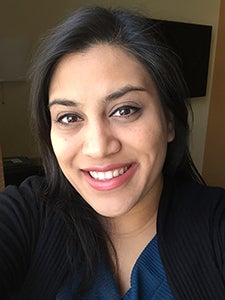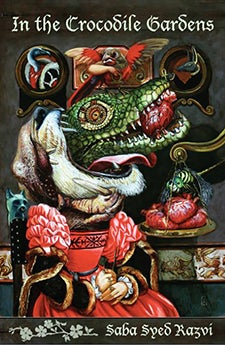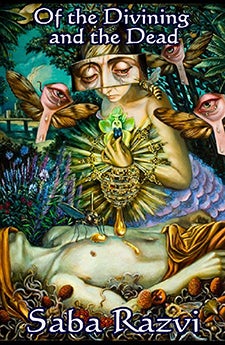
Writing alumna inspired by classics, folklore, dreams and fairy tales
Saba Syed Razvi grew up in Texas attending literary readings, book festivals, museums and Mushairas, or poetry readings in the Urdu language, which she describes as the meeting of slam poetry and literary festivals.
“All these people would come together and cheer each other on as they read original poems,” she remembered. “I can’t remember a time in my life when I wasn’t surrounded by poetry and writing every day. It feels like breathing to me.”
Razvi, who graduated from USC Dornsife with a Ph.D. in creative writing and literature in 2012, recently published her first full-length volume of poetry, In the Crocodile Gardens(Agape Editions, 2016). She is now an assistant professor of English and creative writing at the University of Houston-Victoria, in Texas.

Razvi regularly travels internationally and around the United States attending conferences and presenting her work. Photo courtesy of Saba Syed Razvi.
“In my opinion, the best way to become a writer is to have a strong sense of connection to the writing process and routine,” said Razvi, who also produces fiction, literary criticism and even the occasional libretto. “Whether taking notes for a project, making observations about the day or just writing a journal entry, I make sure to always write consistently. You never know when these passages will make their way into a project.”
Razvi even keeps a notepad under her pillow so she can jot down moments from her dreams as soon as she wakes up.
“I am fascinated by ephemeral and altered states of being — especially liminal spaces or experiences, such as when you’ve just woken up and you haven’t yet had your first cup of coffee or when you’re just drifting off to sleep but haven’t quite settled into it yet,” she said, adding that this interest extends to broader issues of hybridity and “in-between-ness,” as well.
“One of my family’s traditions was to talk about our dreams, so it was breakfast table conversation to talk about and analyze our dreams,” she said. “It was really interesting to discover Freud in college.”
In fact, Razvi said many of the poems from In the Crocodile Gardens were inspired by her dreams.

Razvi recently published her first full-length collection of poems, In the Crocodile Gardens.
“The anthology is characterized by a willingness to familiarize the strange and navigate things that feel other-worldly through a logic that’s normal and familiar,” she explained, citing images that appear in dreams but wouldn’t otherwise make sense in a real-world context.
In addition to drawing inspiration from her own life, Razvi incorporates themes from her family’s background in Hyderabad, India, and more recently Houston, Texas, as well as world and classic literature and fairy tales.
“I love the mythological, fantastic, speculative, playful energy in fairy tales,” she said. “I think good literature and good stories transcend the immediacy of nationality and hang in the heart. It’s something everyone can connect to.”
Razvi’s first two chapbooks of poetry — Of the Divining and the Dead (Finishing Line Press, 2012) and Limerence & Lux (Chax Press, 2016) draw on myth, fairytale, romance and the beauty of ambiguity and intensity. Her forthcoming chapbook Beside the Muezzin’s Call & Beyond the Harem’s Veil” (Finishing Line Press, September 2016) addresses cultural myths and attitudes, especially as they relate to belonging and identity.
During her time studying at USC, Razvi appreciated the creative writing and literature program for its interdisciplinary focus and rigor.

Razvi’s collection of poems Of the Divining and the Dead was published in 2012.
“The community at USC was delightful,” she said, “and the way in which USC connects to the rest of Southern California is really creatively productive.”
Professors whose courses stood out to her as most formative include Carol Muske-Dukes, Paul Alkon, Moshe Lazar, Marjorie Perloff, Aimee Bender, Percival Everett, Susan McCabe and David St. John.
Besides teaching creative writing and working on her own projects, Razvi regularly attends and participates in conferences throughout the world.
“Just this year, I have been to more than 10 different conferences, going to places such as Bern, Switzerland; Barcelona, Spain; and Freiburg, Germany, as well as New Orleans, Los Angeles and Madison, Wisconsin,” she said. “One of the best parts of academic life is participating in the international discourse about literature, aesthetics and philosophy.”
Razvi acknowledges that choosing to pursue a doctoral degree in the humanities can be difficult, but she said the skills she garnered at USC have helped her invaluably in all aspects of her career. A true poet, she also believes in the importance of enjoying one’s profession.
“If you’re passionate about something, you should go for it,” she said. “There are never any guarantees in life. We don’t know how long we have on this planet, and if we love what we do, then every single day will be meaningful despite the obstacles we have to surpass to do it.”